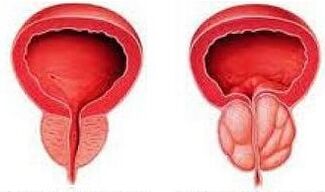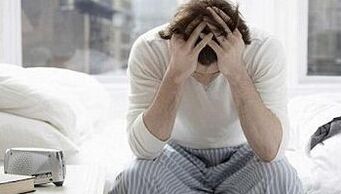Chronic prostatitis is a long -term inflammation of the prostate gland, while symptoms are often absent, which is why most of the male population is not aware of the disease.

The development of a chronic form of prostatitis is a consequence of a sharp process, although in practice, this is quite rare.As a rule, inflammatory chronic prostatitis gradually begins, without any symptoms and unpleasant sensations, the course of the disease is often in accident by the patient, when examining an ultrasound.
Young men and people in the middle and the elderly are subject to a chronic form.Prostatitis also threatens those who lead an inactive lifestyle by the family of their activities, feels an excessive physical effort in the crotch and observe sexual abstinence.
Classification
According to the modern classification of prostatitis, developed in 1995, several categories of the disease are distinguished:
- Acute bacterial prostatitis (OPP) is the most common type of prostatitis.It is generally caused by bacterial infection and is easily diagnosed due to typical signs.Acute bacterial prostatitis can occur at any age.Symptoms include a painful urination, the inability to completely empty the bladder, the pain in the bottom of the abdomen, the back or the pelvic area.There may be a fever accompanied by chills.
- Chronic bacterial prostatitis is a disease with typical symptoms of chronic inflammation and an increased quantity of bacteria and leukocytes in the urine and the secret of prostate after its massage.
- Chronic prostatitis (CP) is the most common form of prostatitis.In most cases, it is a consequence of acute bacterial prostatitis (untreated or poorly treated).If there are symptoms, they occur in the form of pain in the genitals or in the pelvic area, difficulties during urination or painful urination and ejaculation.
- Asymptomatic inflammatory prostatitis - with this form of the disease, the conventional symptoms of prostatitis are absent and the disease itself is detected by chance, when contacting the clinic for a different reason.of an infectious component, they indicate a chronic bacterial prostatitis (infectious);In the absence of microbial pathogens - on non -bacterial (non -infectious) prostatitis.It is believed that in 90 to 95% of all cases, chronic non -bacterial prostatitis occurs and only in 10 to 5% -bacterial.

Reasons
The occurrence of chronic prostatitis can contribute to a number of factors.First of all, it is:
- IPP: chlamydia, ureaplasma, mycoplasma, herpes virus, cytomegalovirus, trichomonades, gonococcus, teen gend, e. coli (Escherichia coli) can affect the urethra and detect prosta in tissues;
- The violation of the blood circulation in the pelvian organs (Prostate leads to its inflammation);
- Sedentary lifestyle (drivers, office workers, civil servants);
- prolonged sexual abstinence interrupted by sexual intercourse or artificial elongation of sexual intercourse;
- Regular hypothermia (Extreme relaxation lovers: diving, surfing and skiing);
- stress: mental and physical overload.
Presence and activity of pathogens of microorganisms are important as a condition in the basin and blood circulation, the presence of concomitant diseases and the level of protective mechanisms.
Symptoms of chronic prostatitis
Most often, with the development of a chronic form of prostatitis, symptoms practically without disturbing a man.In this case, all signs of acute prostatitis will not manifest or manifest themselves in a very lesser extent.
The most common symptoms of chronic prostatitis in men are:
- Periodic pain and unpleasant sensations in perineum;
- Unpleasant sensations in defecation and urination;The urethra.
- Changes in the image of the course of the disease, already not very brilliant, can be so insignificant that patients with chronic prostatitis do not pay much attention to them.
- Exacerbation of chronic prostatitis
The exacerbation of the disease, as a rule, accompanies the following symptoms:
pain and burn in the urethra;
frequent desire of the urinary process;
- pain in the bottom of the abdomen, the perineum and the rectum;
- Douleur dans le bas de l'abdomen, le périnée et le rectum;
- Signs of decreased men of sexual activity;
- Pain during the act of defecation.

According to some doctors, the psychological symptoms of chronic prostatitis can also be distinguished, which include increased irritability, anxiety, fatigue, character, sleep disorders, obsession and depression.3 signs of the disease.For example, the most common is an erection and pain altered at the bottom of the abdomen.
Why can prostatitis cause infertility?
The fact is that the prostate gland produces a special secret which ensures the viability of sperm.With inflammation, the secretory function of the prostate gland worsens, which inevitably affects the quality of the sperm.
In addition, the prostate gland is actively involved in the regulation of testosterone production and the erection process.This is why chronic prostatitis causes a decrease in erectile function, until helplessness.However, these scenarios for the development of the disease can be avoided by performing a timely and competent treatment.
Diagnosis
The following procedures are necessary to help establish / refute the diagnosis:
- rectal study;
- microscopy of the secret of prostate;
- Sow the secret of prostate for antibiotic sensitivity;
- sexually transmitted diseases;
- transrectal ultrasound.
Sometimes endoscopic and urodynamic studies are also carried out.
Chronic prostatitis, treatment is always long and difficult.Its duration depends directly on the stage of the disease to which the patient turned into a specialist.Therapy implies an integrated approach, that is to say a combination of several methods simultaneously:
antibacterial therapy;
- prostate massage;
- Physiotherapeutic procedures;
- Diet and lifestyle correction;
- The use of folk remedies;
- Surgical treatment.In the treatment of the chronic form of the disease.
De plus, des agents anti-inflammatoires et antispasmodiques sont utilisés dans le traitement de la forme chronique de la maladie.
Drugs
The choice of drugs depends on the cause and symptoms of the disease.To cure chronic prostatitis of infectious etiology, antibacterial drugs are used:
- fluoroquinolones;
- macrolides;
- tetracyclines.

To eliminate inflammatory phenomena and pain syndrome, pain relievers and non-hormonal anti-inflammatory drugs are used.Using drugs that were not used before for this purpose: alpha1 blocks, 5-RED red inhibitors, cytokine inhibitors, immunosuppressants, drugs affecting the exchange of urates and citrates.
Physiotherapy
Certain physiotherapeutic procedures, such as laser therapy, electrophoresis, transrectal microwave hyperthermia, ultrasonic phonophorem and others, also help improve prostate trophic tissues and accelerate the remedy fabric.Mud, special enemas can be prescribed.
Prostate massage
It improves the drainage of prostate secrecy and microcirculation at the level of this organ, which in turn contributes to the rapid recovery of the patient.
Prostate massage cannot be carried out with acute prostatitis, hemorrhoids, cracks.Prostate massage is generally combined with antibiotic therapy.Many clinical studies have shown the high effectiveness of such treatment.
Operation
Surgical intervention is possible in order to eliminate the areas of the prostate affected by bacteria.Translating resection is an operation that is carried out under epidural or intravenous barbiturated anesthesia.The postoperative recovery period does not last more than a week.Carrying out independent home therapy depending on the internet exams is responsible for consequences.
Une intervention chirurgicale est possible afin d'éliminer les zones de la prostate affectées par les bactéries. La résection transurétrale est une opération qui est effectuée sous anesthésie barbiturée péridurale ou intraveineuse. La période de récupération postopératoire ne dure pas plus d'une semaine.
Les méthodes qui impliquent le traitement de la prostatite chronique sont déterminées par l'urologue sur la base des informations diagnostiques et de son expérience pratique. Réaliser une thérapie indépendante à domicile en fonction des examens sur Internet est chargé de conséquences.































